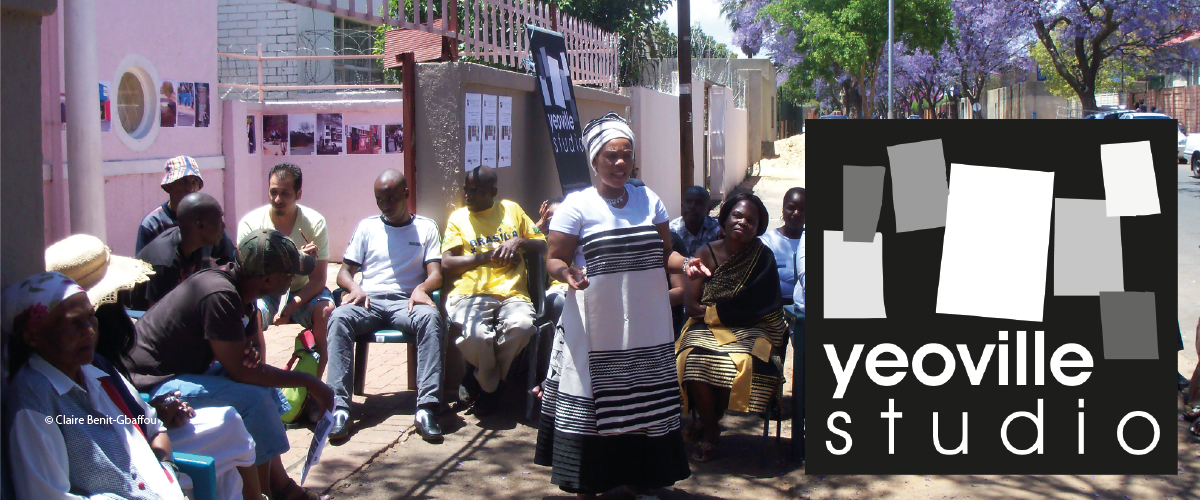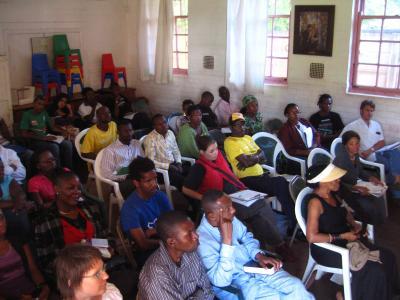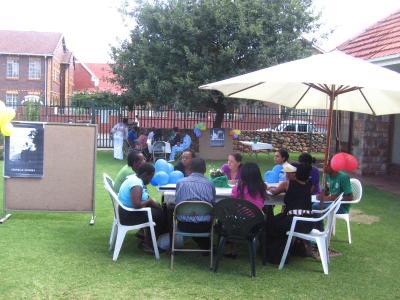
CAFE YEOVILLE
George Lebone (YSF Chair) and Claire Benit-Gbaffou (Wits coordinator) opened the workshop by welcoming residents and Wits staff and students, and presenting the objectives of the workshop:
- Start a dialogue between Wits (staff and students) and Yeoville residents on the different themes identified (housing, urban stories, African diversity, public space)
- Identify key issues in order to jointly build research that is relevant to both academics and residents
Astrid Ley (Wits) explained how the workshop would work – using the image of a suitcase that we jointly need to pack before engaging in a common journey (put in what is useful and take away what is not). Each resident is invited to pick one of the 4 themes to start with, and sit at a table representing that theme. For 20 minutes, the theme will be discussed at this table, facilitated by a Wits staff member. All are provided with pens and encouraged to draw or take notes on the table cloth. After 20 minutes, all participants at a table (but the facilitator and one resident) are invited to change theme and table for a second round of discussion.
The first round would focus on ‘ What does this theme mean to me?’
The second round would focus on ‘How can I get involved?’
Then we would all come back together and present a summary of the discussion.

Round tables – feedback
Yeoville stories – facilitators Naomi Roux (Wits) and Sophie Didier (IFAS)
Many of the participants arrived at this table because they wanted to share their own stories with the group, and were interested in finding a platform for this storytelling.
One of the strongest ideas that emerged in answer to the question of what the meaning and relevance is of “Yeoville Stories” as a theme was that sharing life stories and experiences of living in Yeoville was a way both to celebrate the diversity of Yeoville, and a way of addressing challenges associated with this diversity. One of the phrases that emerged was the idea of “conversations in different languages” – suggesting that the “Stories” theme is more closely linked to the “African diversity” theme than we may have imagined at first. Sharing personal histories was seen by participants as one possible means of finding common ground between people from different backgrounds.
The workshop also suggested that it may be helpful to distinguish between “personal” and “neighbourhood” stories, that it is individual life histories that have led people to Yeoville/ Bellevue, and stories about sites and memories specifically connected with Yeoville. To begin with it may be helpful to choose one of these aspects to focus on rather than trying to be all-encompassing. Or to break “Stories” down further into disparate themes: stories of arrival and departure, stories of meeting, rumours, dreams, stories of home, and so on.
In terms of finding a means for sharing stories and memories, it was suggested by the group that workshops were a good idea and could be very valuable, provided funding is available. It was also suggested that the Yeovue News would be a good way of reaching a wider audience than would be possible in a workshop. Another possible use of the Yeovue News could be running an issue (or more than one if possible) that is researched, written and edited by children, which could also link to the “play” aspect of the Public Space theme.
One possible platform that could be connected to the street festival would be to work towards “signposts” that mark spaces in Yeoville which may look unremarkable from the outside, but are important sites in people’s individual memories – for example, a few people at the table remembered very specifically the date, time and exact street corner of their arrival. This could work in conjunction with workshops around mental mapping and photography.
And finally – Aura suggested that we move away from using the name “Yeoville” two suburbs are experienced as contiguous.
Public space – facilitators Garth Klein (Wits) and Neil Klug (Wits)
The key issues discussed were:
- The meaning of ‘public space’ and the use of public space was contested
- Issues of management and what kind of management of public space was discussed. There were different perceptions of what ‘management’ is, who should manage and how it should be managed. Interestingly the youth was much tougher in its vision of law enforcement, while the older participants were more understanding of informality and the daily needs of residents to survive and make do.
- Education on public space required. Some feel that users need to understand rights and rights of others in public space through education. Others felt that the JMPD need to understand the nature of people using public space for different reasons (another level of awareness/information/ education campaign)
- There is a diverse range of public space needed; education, culture, art, trade, sport, play etc. The existing Recreation Centre does not cater for diversity and range of needs, incomes, age etc
Potential projects emerging from the discussion as areas of possible focus were:
- Rights, Management and Monitoring awareness programmes
- Diversifying the kind of public spaces in Yeovue and incorporating different needs
- Recycling and public space
- Crime and design
Housing – facilitators Kirsten Doerman (Wits) and Mpho Matsipa (Wits)
The designers of the table cloth housing in YeoVue (Yeoville and Bellevue) on the last Sunday of February had many different backgrounds. Amongst others, a woman refugee care taker, activists, political party members, Wits students and trainers, architects, planners, researchers and residents. It was important to hear all their voices to start to understand the complexity of the issue.
In order to develop the base for a design strategy we sampled: questions, wishes, hopes, frustrations, experiences, stories, specifics like prices of houses, rooms, spaces, numbers of people in those houses, rooms, spaces, (non) infrastructure in those houses, rooms, spaces.
The discussion touched on a variety of layers, from politics to gas heaters and moving mattresses. What became evident in those 40 minutes was that YeoVue needs new spatial models that deal with the present and prepare a sustainable future. Housing today seems to be an agglomeration of challenges, problems, fears, stagnant processes – often related to politics and central governing. The necessity to act seems so pressing that then necessity to imagine tends to be secondary. That is something we could change – for a moment. What if we re-imagine housing in YeoVue tomorrow?
The re-design of an existing neighbourhood in prime location next to the city centre could become a new (South) African prototype: urban with gardens and trees, multi cultural and inclusive - not gentrified, dense but not overcrowded, respectful of its citizens, who are clear about their rights and also their responsibilities, a neighbourhood that is safe but not gated, clean, fair and affordable. Impossible? Let’s see. It might just look different than we know it.
“The challenge is rather to practice urban planning [and architecture] without a prescriptive model of the qualities and quantities that a good town should satisfy, in order to always make the best of a given set of circumstances. In the future the quality of new towns will depend on how planners seize the physical, infrastructural, economic and cultural opportunities that are already present and mould them together into something new.” (WIMBY! Welcome into My Backyard! International Building Exhibition Rotterdam-Hoogvliet, Rotterdam 2000, p.52)
African Diversity – facilitators Claire Benit-Gbaffou (Wits) and Eulenda Mkwanazi (Wits)
The participants were mixed – with a number of African migrants (from DRC and Ivory Coast mainly) and CPF representatives in particular. They adopted a constructive approach to the topic: from the call for tolerance and an analysis that there could be communication problems because of different languages, cultures and practices, to the call for working together at the street level to confront common challenges (especially relating to crime), to the understanding that ‘diversity was a spice on its own’. Calls for overcoming (implicit) tensions were made, going beyond the ‘I’ in order to build a ‘we’ (in Yeoville).
Ideas of possible collective and joint involvement were
- Celebrating the diversity of African restaurants but also understanding the need for making the (health/ hygiene) standards better;
- Street festival: involving the youth, involving art. The constraints of a lack of funding were reminded and it was suggested to start from residents initiatives (in the streets) and possibly expand the festival to something more ambitious;
- The market was a point of focus, with a strongly expressed desire of making it more attractive, more customer-friendly; more visibly pan African?
- A discussion started about the need to reinforce street social networks and liaise between different street committees (Regent / Muller for instance), around the issue of safety. The complex role and behavior of street patrollers was raised. The importance of having African migrants represented in these committees and patrols was stressed.

Impressions of the workshop
Most of the people who reacted had a positive reaction to the workshop. Beyond being a pleasant moment overall, several community members stressed the fact that they were delighted about the platform which allowed them to meet other Yeoville residents that they generally do not have the opportunity to meet. They were able to extent their network, share initiatives, and exchange phone number for further cooperation. One community leader said he was so glad to have been able to exchange ideas on his project (street trading) with residents who initially disagreed with his views but after the conversation were more open to other perspectives. In this respect it was a great success and encouraging to organize more of these quite open workshops. Many participants lauded Astrid’s method which allowed for such freedom of expression and nice atmosphere.
As far as the exchange between academia and residents is concerned, the workshop helped realize it is a challenging process and this was only a very preliminary step. Bringing research closer to communities is challenging, both for academic staff themselves (to change their perspectives) and for residents (to understand what research actually means or entails).
Ways forward
Yeoville Stories - Naomi and Sophie to call a meeting to invite people who are interested in participating in research on Yeoville Stories to give more detailed contribution than was possible at the Café. From here we could get a small group (20 people) together who were interested in participating in a series of quite intensive workshops which would be geared towards producing a collective mapping and signposting; and see what other ideas emerge that could include more people.
Public Space: Trading - Second years students are currently working on a survey on perceptions of street trading in Yeoville (Claire and Nqobile ARPL2009). Presentation of their research could be the pretext to organize a debate about this matter and engage with alternative models which could be imagined. Public workshop to be organized possibly early May.
Public Space: Playing - Second year students and wits staff (Garth, Nqobile, Claire, ARPL2009) will be organizing a series of workshops in Sheikh Anta Diop High School (Geography class, grade 11) from mid April. The workshops will be about collecting and discussing narratives of spatial practices in Yeoville, designing maps on Yeoville spaces. The ways in which this material will be displayed and publicized remains to be discussed.
Housing: An alternative model in Yeoville? - Second year Architecture students and Wits staff (Kirsten Doerman and Mpho Matsipha) will facilitate a drawing workshop for interested residents to draw their living space, as a starting point for students to understand the ways in which residents leave in yeoville, and for residents to formalize what are the main challenges they are confronted to in their living spaces. The drawing workshop could be followed by further workshops to empower residents to measure their actual space and further their drawing skills. Students will produce housing models that they can also present to residents at a later stage.

